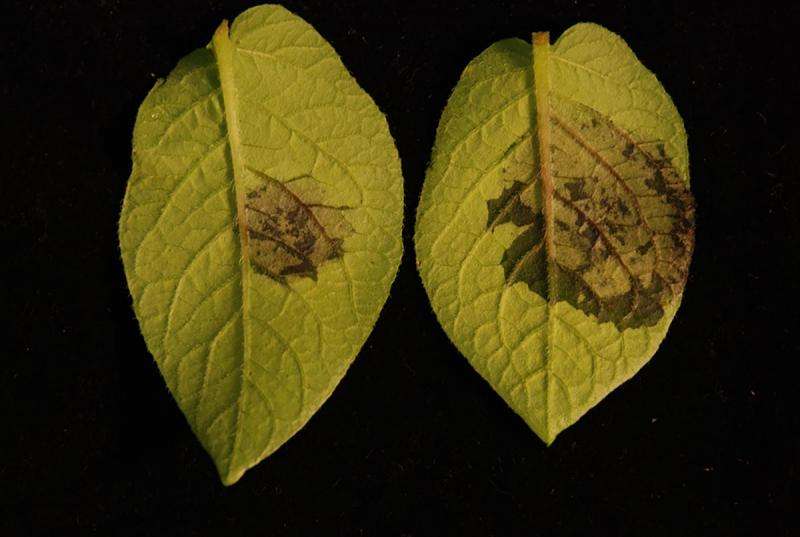Worm pheromones trigger plant defenses, study finds

Plants can sense parasitic roundworms in the soil by picking up on their chemical signals, a team of researchers at the Boyce Thompson Institute for Plant Research (BTI), on the Cornell University campus, has found.
When plants detect pheromones given off by nematode worms, they activate their immune system for protection. But the chemical warning not only triggers defenses against nematodes, but also against bacterial, fungal and viral infection. This discovery, published July 23 in Nature Communications, may yield a nontoxic agricultural treatment against nematodes and other pests.
"It's a very significant discovery that plants can perceive chemical signals from an animal – our work provides some of the first evidence for this," said BTI professor Daniel Klessig. "This discovery also has great potential for protecting plants against pathogens and pests in an environmentally friendly manner."
Plants can "see" light and "hear" the vibrations from chewing caterpillars, but now BTI scientists have found that they can "smell" the essence of parasitic nematodes. By monitoring the worms' chemical signals, plants can sense whether they soon will be under attack.
Nematodes, which are tiny, ubiquitous roundworms, communicate with each other using chemical pheromones, called ascarosides. These excreted compounds regulate the worms' development and behavior. Scientists have identified more than 200 different ascarosides from a wide range of nematode species, showing that ascarosides represent an evolutionarily ancient means of chemical communication.
"When a class of parasites has made the same compounds for millions of years, then their hosts may learn how to detect those molecules. This apparently has happened with plants, which have likely been under nematode attack for several hundred million years," said BTI professor Frank C. Schroeder.
Nematodes live almost everywhere – in soil, compost, water, and in association with plants and animals. While many nematode species are harmless, plant-parasitic nematodes cause an estimated $100 billion in agricultural damage worldwide each year. There are few effective treatments, and regulatory agencies in Europe and the U.S. are phasing out some previously approved pesticides because of toxicity or environmental concerns.
BTI researchers analyzed several of the most damaging plant parasitic nematode species and found that all of them produce one specific ascaroside, called ascr#18.
They hypothesized that plants may have learned to detect this common ascaroside. To test this idea, the team placed the roots of tomato, potato, barley and Arabidopsis thaliana – a laboratory plant – into water spiked with a tiny amount of ascr#18. They then exposed the plants to different pests and pathogens and examined the resulting damage.
"Just a whiff" of ascr#18 triggered a strong immune system response in all tested plant species and induced increased resistance to both root knot and cyst nematodes, two commercially important species of plant-parasitic nematodes. Ascr#18 also decreased susceptibility to all bacterial, fungal and viral pathogens the researchers tested, as well as to oomycetes, a group of funguslike microbes. They saw similar results by simply spraying plant leaves with ascr#18 solution.
"We show that plants have learned to perceive nematodes, and in response to that, they get stronger. They turn on pathways that help them fend off disease," said Schroeder. "Therefore, the use of ascr#18 may have great potential in agricultural applications for broad-spectrum protection."
In future work, the researchers intend to identify the receptor that the plant uses to detect the scent of parasitic nematodes and to uncover the mechanism or mechanisms that underlie this activation of the immune system.
More information: "Conserved nematode signalling molecules elicit plant defenses and pathogen resistance." Nature Communications 6, Article number: 7795 DOI: 10.1038/ncomms8795
Journal information: Nature Communications
Provided by Cornell University




















